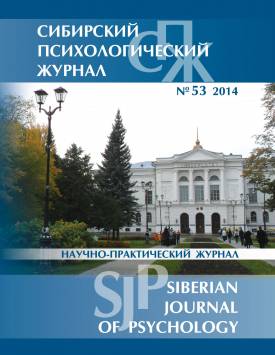The choice of the strategies of mathematical problem solving by students who major in different subject areas
The article reveals the results of the research of cognitive actions during solving mathematical problems by students who major in different subject areas. It depicts the short description of the strategies of solving mathematical tasks. The sample consists of 220 first year students who study at different departments of Tomsk State University. The choice of the first year students as a research sample is influenced with the fact that these students still have active competences in mathematical problem solving (as they passed the math exam half a year ago). In accordance with the areas of study, the respondents were divided into three target groups. The first group included students of applied mathematics and cybernetics who study at physical engineering department, the second group of students study at the department of economics, the third group of students study at the journalism department and institute of arts and culture. The article describes the evaluation model of mathematical creativity by means of solving multiple solution tasks developed by R. Leikin (2009). This model was used to investigate the peculiarities of strategies of solving mathematical tasks. It includes operational definitions and the evaluation schema to study the mathematical creativity, based on three elements: fluency, flexibility and originality - proposed by Torrance (1974). We defined the range of different ways of the solutions of each task based on the similarities and differences of mathematical conceptualization and arranged them into the group. The solutions of the same task were considered to be different if they were based on: different representation of mathematical concepts used in the task, different properties (definitions and theorems) of mathematical objects in definite field or different properties of mathematical objects in different fields. On the basis of empirical data we were able to identify collective solution space (the set of solutions proposed by the group) and individual solution space (all of the solutions proposed by students). We estimated the indicators of correctness, fluency, flexibility, originality and creativity for each task for every participant in accordance with individual and collective solution spaces. The foundation for classification of strategies of solving mathematical tasks was the number of proposed solutions to the task, their effectiveness (finding the right solutions), the number of used mathematical approaches (ideas, concepts, algorithms, tools). The paper reveals the results of the scientific research that demonstrate the priorities of the students' choices of different trends of the strategies of mathematical problem solving, that are traditionally used for evaluation of mathematical creativity. It is noted that the choice of strategies for solving mathematical problems varies depending on the type of problem presented in all three groups of students. The general conclusions state that: - in the students' selection of strategies for solving mathematical problems involving mathematical creativity dominates "elementary" and "reproductive variability" strategy; - the selection of students of a particular strategy for solving mathematical problems that has multiple solutions, depends not only on the field of study (depth of study of mathematics and mathematical competence), but also on the type of tasks and the structural complexity of mathematical problem. The introduction of psycho-educational technologies that are focused on the actualization of the resources of self-development as the process and outcome of cognitive potential into educational programs of professional training of students is supported.
Keywords
originality, flexibility, fluency, mathematical creativity, the strategies of mathematical problem solving, оригинальность, гибкость, беглость, математическая креативность, стратегии решения математических задачAuthors
| Name | Organization | |
| Vaulina Tatiana A. | Tomsk State University | vaulina@rambler.ru |
| Krasnoryadtseva Olga M. | Tomsk State University | krasnoo@mail.ru |
| Shcheglova Eleonora A. | Tomsk State University | shcheglova@sibmail.com |
References

The choice of the strategies of mathematical problem solving by students who major in different subject areas | Sibirskiy Psikhologicheskiy Zhurnal – Siberian Journal of Psychology. 2014. № 53.
